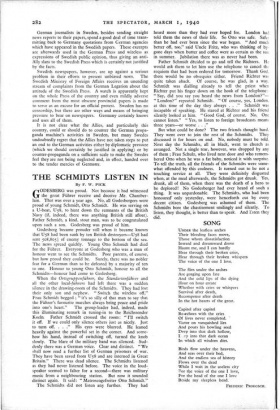THE SCHMIDTS LISTEN IN
By F. W. PICK
GODESBERG was proud. Not because it had witnessed the great Fiihrer receive and deceive Mr. Chamber- lain. That was over a year ago. No, all Godesbergers were proud of young Schmidt, Otto Schmidt. He was serving on a U-boat, U58, to hunt down the remnants of the British Navy (if, indeed, there was anything British still afloat). Father Schmidt, a kind, stout man, was to be congratulated upon such a son. Godesberg was proud of him.
Godesberg became prouder still when it became known that U58 had been sunk by ten British destroyers—U58 had sent 508,8o51 of enemy tonnage to the bottom of the sea. The news spread quickly. Young Otto Schmidt had died for the Fiihrer. Everyone at Godesberg who was a man of honour went to see the Schmidts. Poor parents, of course, but how proud they could be. Surely, there was no nobler feat for a German than to be defeated by a majority of ten to one. Honour to young Otto Schmidt, honour to all the Schmidts—honour had come to Godesberg.
When the Ortsgruppenfiihrer, the StandartenfiThrer and all the other local-fiihrers had left there was a sudden silence in the drawing-room of the Schmidts. They had lost their only son and nephew. " Switch the wireless off," Frau Schmidt begged ; " it's so silly of that man to say that the Fiihrer's favourite marches always bring peace and pride into one's heart." The group-leader had, indeed, made this illuminating remark in tuning-in to the Reichssender Koeln. Father Schmidt crossed the room: " I'll switch it off. If we could only silence others just as nicely. Just to turn off. . . ." His eyes were blurred. He leaned heavily against the powerful set in the corner. And some- how his hand, instead of switching off, turned the knob slowly. The blare of the military band was silenced. Sud- denly there was a German voice. Clear and distinct. " We shall now read a further list of German prisoners of war. They have been saved from U58 and are interned in Great Britain." There was dead silence. The Schmidts listened as they had never listened before. The voice in the loud- speaker seemed to falter for a second—there was military music from a neighbouring station. But now it sounded distinct again. It said: " Matrosengefreiter Otto Schmidt."
The Schmidts did not listen any further. They had heard more than they had ever hoped for. London had told them the news of their life. So Otto was safe. Safer than he had ever been since the war began. " And much better off, too," said Uncle Fritz, who was thinking of by- gone days when butter and coffee were as certain as the sun in summer. Jubilation there was as never had been.
Father Schmidt decided to go and tell the Richters. He would ask them to let him use the telephone to cancel the requiem that had been ordered for tomorrow. Thank God, there would be no obsequies either. Friend Richter was quite taken aback. Of course, he was glad, in a way. Schmidt was dialling already to tell the priest when Richter put his finger down on the hook of the telephone: " Say, did you say you heard the news from London?"— "London?" repeated Schmidt. " Of course, yes, London, at this time of the day they always . . ." Schmidt was incapable of speaking. He stared at Richter and his friend silently looked at him. " Good God, of course. No. One cannot listen." " Yes, to listen to foreign broadcasts means three years—or worse . . ."
But what could be done? The two friends thought hard. They went over to join the rest of the Schmidts. They discussed it for hours on end. No, nobody must be told. Next day the Schmidts, all in black, went to church as arranged. Not a single tear, however, was dropped by any of them ; Frau Schulz, who lived next door and who remem- bered Otto when he was a fat baby, noticed it with surprise. To tell the truth, all the friends of the Schmidts were some- what offended by this coolness. It turned out to be not a touching service at all. They were definitely disgusted when, at the meal afterwards, the Schmidts got drunk. Yes, drunk, all of them, when there was the death of a hero to be deplored! No Godesberger had ever heard of such a thing. It was unpardonable. The Schmidts, who had been honoured only yesterday, were henceforth cut by every decent citizen. Godesberg was ashamed of them. The Schmidts bore the chastisement smilingly and silently. To listen, they thought, is better than to speak. And Esten they did.














































 Previous page
Previous page